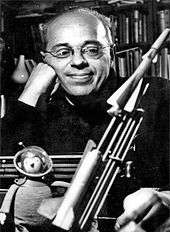Professor A. Dońda
Professor A. Dońda (From the Memoirs of Ijon Tichy) (Polish: Profesor A. Dońda (Ze wspomnień Ijona Tichego) is a satirical apocalyptic science fiction novelette by Polish writer Stanisław Lem. It was first published in a satirical magazine Szpilki in 1973[1] and later republished in several collections and anthologies.[2]
It was translated into French (1977), German (1978, 1980), Portuguese (1987)[2], as well as into Russian (1988, 1993) and Ukrainian (2017).[3]
Plot
The novel is a kind of "story within a story". The "frame story" starts with the author (Ijon Tichy) complaining that he has to cut his memoir in clay tablets, the way Babylonians did. This unfortunate situation resulted from the world ignoring the warning of professor Dońda (whose sidekick was Ijon Tichy), who established that information has a kind of "critical mass", and when it is exceeded, similar to uranium, a destructive chain reaction may happen.[4] Tichy then proceeds to tell the story of the professor, whose whole life, literally from his very conception was a chain of errors and coincidences, which eventually led to his discovery and the ignored prediction of the catastrophe.
Dońda's Law
The doomsday conclusion was derived from the following "Dońda's Law":
"Whatever a small computer with a large program can do, a big computer with a small program can do the same; hence the logical conclusion is that an infinitely large program can work alone, i.e. without any computer".[5]
Dońda further explains his reasoning: "Well, what does it mean that infinitely much information can work directly, without the help of any devices? This means that the enormity of information will manifest itself directly. I figured it out, but I didn't know the formula of equivalence [similar to the mass–energy equivalence ]. ... Simply, how much information weighs. So I had to devise this whole project. I had to. Now I know. The machine became 0.01 grams heavier: that is the weight of the information entered."
Commentary
Jerzy Jarzębski in his afterword to Dzienniki gwiazdowe writes that the story of professor Dońda is not only a "comedy of errors" but also an illustration of Lem's idea that the chance is a driving force of the change,[6] expounded by Lem in his essay The Philosophy of Chance. In the words of Donda, the whole evolution "is based on the error, because an error imprints onto an error, turns out to be an error, creates an error, so that chance [losowość in the original] turns into the Fate of the World [Los Świata]".[6]
The catastrophic finale of the novel resembles that of another adventure of Ijon Tichy: Peace on Earth ends with a silent devastation of the whole Earth's technological infrastructure and information stored in it.[1] Jerzy Jarzębski observes that it also resembles the finales of other Lem's novels: The Invincible, and Memoirs Found in a Bathtub.[7]
References
- Paweł Kozioł, ""Dzienniki gwiazdowe" Stanisława Lema", culture.pl, May 17, 2011
- Professor A. Dońda title listing at the Internet Speculative Fiction Database
- Профессор А. Донда, fantlab.ru (in Russian)
- "Profesor Dońda", wyborcza.pl August 30, 2011 (in Polish)
- "W polskich firmach blogują", Computerworld, Polish edition, June 2, 2009
- Jerzy Jarzębski, "Spór Między Munchhausenem A Guliwerem" an afterword to Dzienniki gwiazdowe
- "KALLOTOMIA PLANETARNA" [Planetary Callotomy], an afterword by Jerzy Jarzębski
![]()
